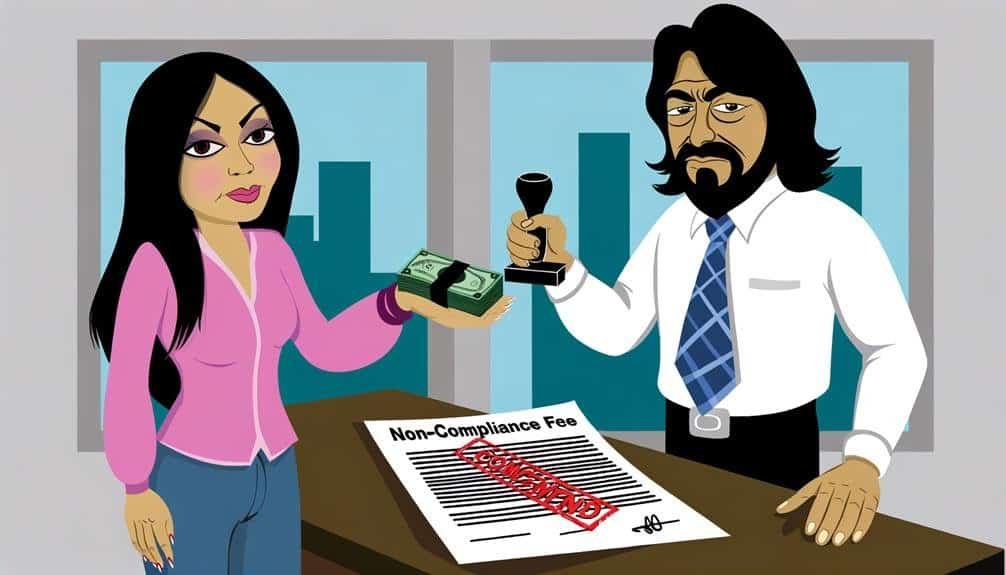What Is a Non-Compliance Fee?
Curious about the concept of a non-compliance fee? Wondering what it entails and why it's even a thing?
Well, buckle up and brace yourself for an enlightening exploration of this intriguing topic. Non-compliance fees are not to be taken lightly, as they can have significant implications for individuals and businesses alike.
So, without further ado, let's dig into the depths of this enigmatic fee and uncover its secrets.
Key Takeaways
- Non-compliance fees are financial penalties imposed for failing to adhere to rules, regulations, or agreements.
- These fees serve as a deterrent and encourage timely and proper adherence.
- Non-compliance fees have significant implications for individuals and organizations, including financial strain and damage to reputation.
- To avoid non-compliance fees, it is important to stay informed about regulatory changes, maintain accurate compliance records, implement internal controls, and provide comprehensive training to employees.
Definition of Non-Compliance Fee
A non-compliance fee is a financial penalty imposed on individuals or organizations for failing to adhere to rules, regulations, or agreements.
It's essential to understand the importance and implications of non-compliance fees. These fees serve as a deterrent to ensure that individuals and organizations comply with established rules and regulations. By imposing financial penalties, non-compliance fees encourage timely and proper adherence, ultimately promoting fairness and accountability.
Non-compliance fees also have significant implications for both individuals and organizations. For individuals, these fees can result in financial strain and potentially damage their reputation. For organizations, non-compliance fees can lead to loss of revenue, legal consequences, and harm to their public image.
It's crucial for individuals and organizations to prioritize compliance to avoid the negative impact of non-compliance fees.
Reasons for Imposing Non-Compliance Fees
Non-compliance fees are imposed for a variety of reasons, ensuring accountability and encouraging compliance with established rules and regulations. Here are three key reasons why these fees are imposed:
- Cost of non-compliance: Non-compliance can lead to financial losses for businesses. Violations can result in fines, penalties, and legal expenses, which can have a significant impact on the bottom line. Imposing non-compliance fees serves as a deterrent and encourages businesses to meet their obligations to avoid these costs.
- Impact on business operations: Non-compliance can disrupt business operations. It can lead to delays, reputational damage, and even lawsuits. By imposing non-compliance fees, organizations aim to minimize the negative impact that non-compliant behavior can have on their operations.
- Encouraging compliance: Non-compliance fees incentivize businesses to comply with regulations and rules. By imposing financial consequences for non-compliance, organizations promote a culture of adherence to established standards, ensuring fairness, and maintaining a level playing field for all parties involved.
Calculation Methods for Non-Compliance Fees
To determine the amount of non-compliance fees, organizations employ various calculation methods that take into account the severity and frequency of the violations. These methods are designed to ensure that the fees are fair and proportional to the non-compliant behavior.
One common calculation method is to assign a fixed fee for each violation, with the amount determined by industry standards. Another approach is to use a tiered system, where the fee increases with each subsequent violation. This encourages organizations to implement reduction strategies and improve their compliance record.
Some organizations also consider the financial impact of the violations on the affected parties when calculating the fees.
Consequences of Incurring Non-Compliance Fees
Incurring non-compliance fees can have significant ramifications for organizations, serving as a strong deterrent against further violations. Here are three key consequences of incurring non-compliance fees:
- Financial Impact: Non-compliance fees can impose a substantial financial burden on businesses. These fees can range from a fixed amount to a percentage of the revenue generated by the organization. The financial strain can hinder growth and profitability.
- Reputational Damage: Non-compliance fees can tarnish a company's reputation. When businesses fail to meet regulatory requirements, it can erode customer trust and loyalty. Negative publicity and public perception can lead to a loss of customers and potential business opportunities.
- Legal Implications: Incurring non-compliance fees can also result in legal repercussions. Regulatory authorities may impose additional penalties or initiate legal proceedings against the organization. This can lead to costly litigation, damage to the company's credibility, and potential criminal charges for severe violations.
It is crucial for businesses to understand the impact of non-compliance fees on their operations and take proactive measures to ensure compliance with applicable regulations.
Tips to Avoid Non-Compliance Fees
Take proactive steps to ensure compliance and avoid incurring non-compliance fees. Understanding the common pitfalls in complying with regulations is essential to maintaining compliance.
One of the most common pitfalls is a lack of awareness or understanding of the regulations applicable to your industry. Stay informed about regulatory changes by regularly reviewing industry publications, attending seminars, and seeking guidance from legal professionals.
Another pitfall is poor record-keeping. Maintain accurate and up-to-date records of all relevant compliance documents, such as permits, licenses, and certifications. Implement internal controls and regular audits to ensure compliance.
Develop and enforce comprehensive compliance policies and procedures, and provide training to employees to ensure they understand their responsibilities.
Conclusion
In conclusion, non-compliance fees are charges imposed for failing to meet certain requirements or regulations. These fees serve as a deterrent and incentive for individuals or businesses to adhere to the rules.
It's important to understand the reasons for imposing these fees, the methods for calculating them, and the potential consequences of incurring them. By following the tips provided, you can avoid these fees and ensure compliance with regulations.
Remember, 'an ounce of prevention is worth a pound of cure.'


